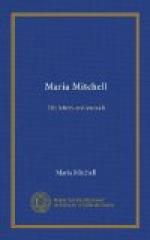“I saw a little boy in England tormenting a smaller one. He spat upon his cap, and then declared that the little one did it. The little one sobbed and said he didn’t. I gave the little one a penny; he evidently did not know the value of the coin, and appealed to the bigger boy. ’Is it a penny?’ he asked, with a look of amazement. ‘Yes,’ said the bigger. Off ran the smaller one triumphant, and the bigger began to cry, which I permitted him to do.”
CHAPTER VII
1857-1858
FIRST EUROPEAN TOUR CONTINUED—LEVERRIER AND THE PARIS OBSERVATORY—ROME—HARRIET HOSMER—OBSERVATORY OF THE COLLEGIO ROMANO—SECCHI
At this time, the feeling between astronomers of Great Britain and those of the United States was not very cordial. It was the time when Adams and Leverrier were contending to which of them belonged the honor of the discovery of the planet Neptune, and each side had its strong partisans.
Among Miss Mitchell’s papers we find the following with reference to this subject:
“... Adams, a graduate of Cambridge, made the calculations which showed how an unseen body must exist whose influences were felt by Uranus. It was a problem of great difficulty, for he had some half-dozen quantities touching Uranus which were not accurately known, and as many wholly unknown concerning the unseen planet. We think it a difficult question which involves three or four unknown quantities with too few circumstances, but this problem involved twelve or thirteen, so that x, y, z reached pretty high up into the alphabet. But Adams, having worked the problem, carried his work to Airy, the Astronomer Royal of England, and awaited his comments. A little later Leverrier, the French astronomer, completed the same problem, and waiting for no authority beyond his own, flung his discovery out to the world with the self-confidence of a Frenchman....
“... When the news of the discovery of Neptune reached this country, I happened to be visiting at the observatory in Cambridge, Mass. Professor Bond (the elder) had looked for the planet the night before I arrived at his house, and he looked again the evening that I came.
“His observatory was then a small, round building, and in it was a small telescope; he had drawn a map of a group of stars, one of which he supposed was not a star, but the planet. He set the telescope to this group, and asking his son to count the seconds, he allowed the stars to pass by the motion of the earth across the field. If they kept the relative distance of the night before, they were all stars; if any one had approached or receded from the others, it was a planet; and when the father looked at his son’s record he said, ’One of those has moved, and it is the one which I thought last night was the planet.’ He looked again at the group, and the son said, ’Father, do give me a look at the new planet—you are the only man in America that can do it!’ And then we both looked; it looked precisely like a small star, and George and I both asked, ‘What made you think last night that it was the new planet?’ Mr. Bond could only say, ’I don’t know, it looked different from the others.’




